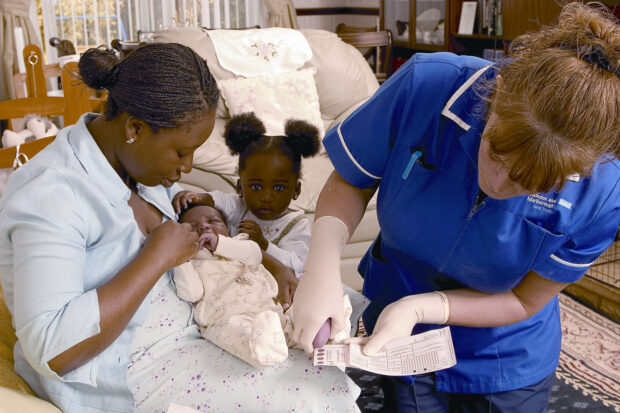In his second blog post written for his fellow GPs, Dr Jim McMorran looks at newborn blood spot screening – more commonly known as the heel prick test.

Newborn blood spot screening is a routine part of the screening pathway for babies in England.
For most, this means a midwife carries out the test in the home when the baby is 5 days old. The blood spots are sent to a laboratory for analysis and the parents receive the results within 6 weeks to record in their baby’s personal child health record (red book).
It can be a cause of frustration that newborn blood spot results are not linked directly to our GP practice systems. Sending newborn screening results electronically to GP systems will hopefully be part of the child health digital strategy that NHS England is leading on with stakeholders in health, education, social care and voluntary organisations.
Until relatively recently, the NHS Newborn Blood Spot Screening Programme screened for 5 conditions – sickle cell disease (SCD), cystic fibrosis (CF), congenital hypothyroidism (CHT), phenylketonuria (PKU) and medium-chain acyl-CoA dehydrogenase deficiency (MCADD). In January 2015, it expanded to screen for 4 more rare but serious inherited metabolic diseases (IMDs) – maple syrup urine disease (MSUD), isovaleric acidaemia (IVA), glutaric aciduria type 1 (GA1) and homocystinuria (HCU) – helping to prevent severe disability or even death for around 30 more babies every year.
Parents can decline screening for CHT, SCD, CF or for all 6 IMDs.
If babies miss out on screening at 5 days then they can still be screened up to 12 months old for 8 of the 9 conditions (the test for CF is only reliable up to 8 weeks of age). As GPs, we have an important role to play in ensuring correct processes are followed for infants who miss out on newborn blood spot screening at 5 days or whose results are missing. These can include babies who were born abroad and those whose mothers declined screening immediately after birth.
Other countries routinely screen for SCD, CF, CHT, PKU and MCADD. Screening should not be offered for babies who have already been screened for these 5 conditions elsewhere. If documented results in English for these 5 conditions cannot be found, then screening should be offered – provided the blood spot sample can be taken before their first birthday.
If parents decide not to accept the offer of screening, or their baby is over a year old, this should be recorded in clinical notes on the child health information system. Parents of babies who have not been tested are advised to remind staff if their baby then shows signs of chronic health problems such as developmental delay, chronic diarrhoea or repeated lower respiratory tract infections.
PHE Screening Blogs
PHE Screening BLOGs provide up to date news from all NHS Screening programmes– replacing our previously published newsletters.
You can register to receive updates direct to your inbox, so there’s no need to keep checking for new blogs.